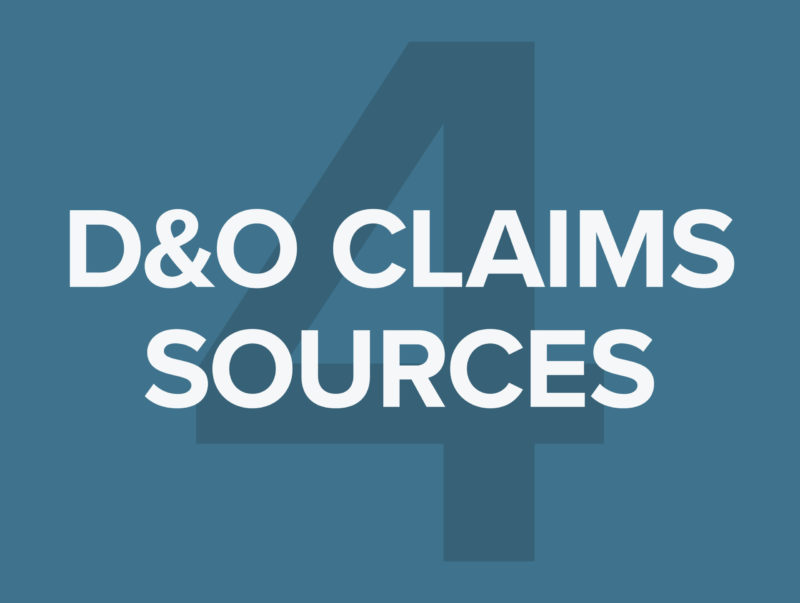What is directors and officers?
Unlike a commercial general liability insurance policy that provides coverage for claims arising from property damage and bodily injury, a directors’ and officers’ liability (D&O) policy specifically provides coverage for a “wrongful act,” such as an actual or alleged error, omission, misleading statement, neglect or breach of duty.
A D&O policy provides defense costs and indemnity coverage, such as:
- Coverage for individual directors and officers
- Reimbursement to the organization for a contractual obligation to indemnify directors and officers that serve on the board
- Protection for the organization or entity itself


Does my business need D&O insurance?
Regardless of your company’s size, the legal cost to defend a director is substantial, as are the potential personal penalties. Due to the personal liability risk—which is not covered under a personal insurance policy—protecting boardroom talent can be a challenge. To help ensure both your officers’ and company’s well-being, a D&O policy is part of a comprehensive risk financing strategy.
Who can bring a D&O lawsuit?
Shareholders and employees are the most likely groups to sue private companies. Other parties may include corporations against themselves, and a variety of third parties, such as competitors, vendors, creditors and regulatory bodies.
For example, a manufacturer told one of its suppliers to increase inventory because they were expecting a large increase in production. As predicted, demand for the manufacturer’s product grew, but the manufacturer increased its inventory with another vendor. The original supplier successfully sued the manufacturer, alleging they suffered damages as a result of having relied on the manufacturer’s promise.
D&O fills the coverage gap
Wrongful acts
Unlike a commercial general liability policy that provides coverage for claims arising from property damage and bodily injury, a D&O policy specifically provides coverage for a “wrongful act,” such as an actual or alleged error, omission, misleading statement, neglect or breach of duty.
Tailored protection
D&O coverage can be tailored to your needs, but be aware that D&O carriers are not consistent with their policy forms. This fact, plus the complexity of D&O claims, requires the carrier to have market commitment and deep expertise, as well as the financial resources to handle potential claims.
Additional coverages
Additional forms of coverage to protect directors and officers, including the following:
- Entity coverage
- Payment priority for insured persons
- Severability of the insured as well as severability of the application
- Coverage over time, meaning coverage responds to past, present and future directors and officers
- Pay on behalf clause
- Duty to defend clause
Additional endorsements
In addition, some D&O polices can be endorsed to provide employment practices liability (EPL) coverage and/or fiduciary liability.
- While employment practices liability endorsements under a D&O policy broaden coverage, they often do not provide a duty to defend clause and are subject to a substantial deductible. Many EPL endorsements do not provide for a separate limit of liability in addition to the limit available under the D&O policy. If the D&O limit is reduced or exhausted by payment of an employment practices claim involving the wrongful conduct of an employee, a director’s or officer’s personal assets may be at risk.
- Fiduciary liability provides coverage for liabilities arising out of ERISA, where fiduciaries are personally liable for losses to a benefit plan incurred because of alleged errors, omissions, or breach of their fiduciary duties.
Fraud exclusion
A “fraud” exclusion is typically included in a D&O policy, which eliminates coverage for losses due to dishonest or fraudulent acts or omission, or willful violations of any statute, rule or law.
More management liability coverages
Employment practices liability (EPLI)
Covers losses resulting from employment practices disputes, such as claims filed for discrimination, sexual harassment and wrongful termination.
Fiduciary liability
Covers losses resulting from mismanagement of employee benefit and pension plans.
Errors and omissions (E&O)
Covers losses resulting from negligent acts, omissions or errors.
Crime insurance
Covers losses resulting from employee or outsider criminal activity such as theft, fraud, forgery and employee dishonesty.

